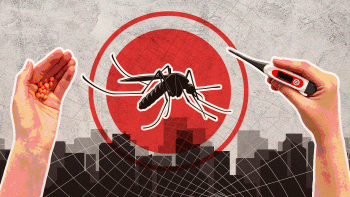How to reduce the prevalence and out-of-pocket costs of dengue infections

Despite efforts by the two Dhaka city corporations to control dengue over the past few years, the number of cases and deaths has risen significantly. In 2019, there were 101,354 cases and 179 deaths. By 2023, these numbers had surged to 321,179 cases and 1,705 deaths. This increase indicates that the measures taken have been inadequate, and more needs to be done to address the issue effectively.
One study estimates that globally about 96 million dengue cases are clinically manifested per year, mostly found in urban and semi-urban areas in tropical and subtropical climates. Also, the burden of dengue infections has dramatically increased over the past decades, with the number of symptomatic dengue infection reports doubling every 10 years between 1990 and 2013.
Bangladesh is situated in the tropical and subtropical regions, and like other Southeast Asian countries, it has become a suitable habitat for the dengue vector and has experienced increased transmission in recent years. The disease is expected to expand its geographical range due to favourable conditions provided by rapidly growing high-density urban areas along with socio-economic changes, increased worldwide travel and trade, and climate change. A risk factor study on dengue infections in urban Dhaka found that nearly 82 percent of identified immature mosquitoes were Aedes aegypti, responsible for dengue. Dengue fever is painful and affects people of all ages, including infants, young children, and adults and data indicates that Dhaka city is at most risk and requires urgent preventive intervention measures.
Dengue cases were highly prevalent in Dhaka division in 2023 and more than half of the total cases and most dengue-related deaths occurred in Dhaka city alone, indicating a health hazard for city dwellers. It should be noted that these numbers come from hospital records. A large number of dengue cases are treated at the community level. Therefore, the actual number of cases and deaths is still unknown and even under-reported in Bangladesh. Experts estimate that about 2.4 million people suffers dengue infections annually, with most cases belonging to major cities like Dhaka and Chattogram.
Dhaka is often recognised as one of the poorest megacities, grappling with many problems such as pollution, horrendous traffic jams, unregulated construction work, brick kilns, and vehicles running on fuel containing higher levels of sulfur and other detrimental substances that pose grave threats to public health. Further, migration to urban megacities may impact individuals' hygiene, working, and living conditions, directly affecting city dwellers' health status. Thus, dengue infection is an emerging public health concern in urban Dhaka, and the cost of dengue infection is higher in metropolitan Dhaka than in other parts of the country due to livelihood costs.
A growing body of literature shows that dengue imposes an enormous socio-economic burden on households, healthcare systems, and government health expenditures in endemic countries, particularly during outbreaks. A recent BIDS study titled, "Economic Burden of Dengue in Urban Bangladesh: A Societal Perspective," published in 2023 in the PLoS Neglected Tropical Diseases, provides a detailed analysis of this economic burden. The average out-of-pocket (OOP) cost of dengue was about $316.51, representing 56 percent of total monthly household income. For the poorest quintile, this cost exceeded 139 percent of their total household income, while the wealthiest quintile spent only 36 percent of their household income, highlighting a severe financial disparity among city dwellers. To mitigate the OOP cost of dengue, urban dwellers need to exhaust resources from their regular income (62.3 percent), borrow from others (47.7 percent), use savings (41.7 percent), rely on family donations (18.9 percent), and even sell permanent assets (1 percent).
There is an urgent need for an effective national prevention strategy to achieve considerable cost savings and reduce morbidity from dengue. Policymakers should consider the OOP cost of dengue infections, particularly among low-income people, while balancing the benefits of introducing potentially effective dengue preventive programmes in dengue hotspots like urban Dhaka.
Different preventive measures such as water and waste management strategies and community education campaigns focusing on these risk factors should be taken to tackle dengue infections in metropolitan cities including Dhaka. The measures at household levels may include eliminating mosquito breeding grounds, effective solid waste disposal, using mosquito coils, aerosols, mosquito nets, cleaning larval habitats weekly (overhead tanks, groundwater storage tanks, air coolers, refrigerators, flower vases, earthen jars, cement tanks, plastic drums), applying insecticides, and using window screens, coils, and vapourisers. A joint effort involving public, private, and non-governmental organisations is necessary to tackle the burden of dengue.
Another potential short-term solution is introducing a vaccine against the dengue virus in dengue hotspots. Vaccines are often considered the "best-buy" as they reduce disease incidence and case fatalities, saves OOP expenditure, avoids productivity losses, mitigates excessive pressure on the health system, and ensures equity. While the dengue vaccination programme is yet to be conducted in Bangladesh, such a preventive programme has proven cost-effective in many countries like Indonesia, Brazil, and Thailand. As dengue is emerging in Bangladesh, various preventive strategies should be considered year-round and not just at the beginning of the monsoon season to halt dengue infections and improve health outcomes.
Abdur Razzaque Sarker is health economist at the Bangladesh Institute of Development Studies (BIDS).
Md Mohin Uddin Mizan is publication and communication professional at the Bangladesh Institute of Development Studies (BIDS).
Views expressed in this article are the author's own.
Follow The Daily Star Opinion on Facebook for the latest opinions, commentaries and analyses by experts and professionals. To contribute your article or letter to The Daily Star Opinion, see our guidelines for submission.

 For all latest news, follow The Daily Star's Google News channel.
For all latest news, follow The Daily Star's Google News channel. 










Comments